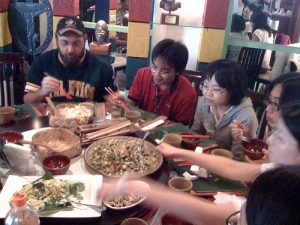Revised Common Lectionary Reflection, Ninth Sunday after Pentecost, Proper 11, Year B
July 22, 2018
Lessons: Jeremiah 23:1-6; Psalm 23; Ephesians 2:11-22; Mark 6:30-34; 53-56
Theme: God’s faithful and generous people continue to be works in progress, becoming a fit dwelling for the Spirit of God.
Key Scriptures: So he came and proclaimed peace to you who were far off and peace to those who were near; for through him both of us have access in one Spirit to the Father. Ephesians 2:17-18
Preaching/Teaching Reflection
Insiders and outsiders in the church? That’s certainly nothing new. For thousands of years, God’s people have been scratching lines in the sand, building walls, closing doors, erecting  fences, and making sure that outsiders stay out. We just aren’t comfortable with folks who are different from us and the change required to incorporate new people into our communities. There’s science behind this, too. All living things possess a drive that seeks to achieve and maintain homeostasis. We don’t like our apple carts upset, be they literal or metaphorical.
fences, and making sure that outsiders stay out. We just aren’t comfortable with folks who are different from us and the change required to incorporate new people into our communities. There’s science behind this, too. All living things possess a drive that seeks to achieve and maintain homeostasis. We don’t like our apple carts upset, be they literal or metaphorical.
Building walls was not what Jesus was all about. In fact, he seemed quite determined to break down walls and cross borders. Instead of hanging out with the cool kids and the power players, he seemed to naturally gravitate toward the outsiders and the margins. Jesus was in the business of drawing a wider circle and including those on the outside.
In reminding the Christians at Ephesus of their incorporation into God’s family, Paul assures them of their place at the family table, but perhaps he also intends for them to think about their insider status in light of those who are yet to be brought in. Who isn’t at the table in the Body of Christ at Ephesus? What is their role in continuing to see that this beloved community is built up and expanded to others?
This lesson is timely for us today. Our cultural landscape is one marred by divisions, walls, and various barriers of the physical and metaphorical kind. Whether it’s a border wall between our country and Mexico, or the wall between Jerusalem and the West Bank, or laws and ordinances that make equal access difficult or impossible, we humans are still in the business of keeping outsiders out and insiders in.
Who is not at the table in our churches? Are there any people who would not be welcome just as they are? What about people of different races or ethnicities? Folks who are part of the LGBTQIA community? Are people who struggling with addictive disorders welcome? How about returning citizens from the criminal justice system? Most of our congregations claim to be welcoming and open, but do we put our lives where our words are? More importantly, how willing are we to go out and live, work, and socialize among those who are somehow different from us?
Here’s the thing: According to Paul, God is doing a new thing and creating something new in our midst. It’s important for us to remember our history and that we were once outsiders, too. If  God welcomed us, then we are called to extend that grace and mercy to others. Christ welcomes all people to his table; there are no Jews, Greeks, males, females, slaves, or free folk. All are one in Christ Jesus (Gal. 3:28).
God welcomed us, then we are called to extend that grace and mercy to others. Christ welcomes all people to his table; there are no Jews, Greeks, males, females, slaves, or free folk. All are one in Christ Jesus (Gal. 3:28).
Imagine if we, as faith communities, truly sought to embody the words of this week’s epistle lesson. What if we truly aimed to be “inside/out” communities where everyone is welcome, and we all are sent outside of our comfort zones and buildings to forge relationships with “outsiders”? In remembering our own stories of adoption and incorporation and in having open and honest conversation about our fears, misconceptions, prejudice, and sin, by the grace of God and that relentless Holy Spirit working in us, we can begin to restore and renew the world, one inside/out congregation at a time. Truly, Christ is our peace. My prayer is that if we’re not acting like it, we can begin steps in that direction. Blessings on your preaching and teaching.
In Worship
Consider singing “All are Welcome” (Marty Haugen) in worship this week. It might even work well to incorporate the verses into your sermon or homily.
It might also be interesting to find out where congregants ancestors came from. How many countries are represented in the family histories of your folk? You might also explore the specific ethnic history of your congregation’s founding and how that has affected the congregation’s path over the years. Was there a time when that history became subsumed in a common identity?
With Youth
Have your youth post a world map in a visible place and invite congregants to place push pins on places they have lived or visited. Talk with youth about their own travel experiences. Where have they been? Where would they like to go? How might their faith have an impact on their travel and the choices they make?
With Children
Destination Discipleship! Make a simple paper “passport to faith” for each child. You can be elaborate or simple as you wish. Make each page a milestone or marker in faith and discipleship. You might have a page for baptism, one for Holy Communion, one for Scripture, and so forth. Invite the children to walk around the worship space with you and receive a stamp or sticker for each “destination.” Remind the children that even though they are citizens of a particular country, more importantly they are citizens with God’s people. Finish with a simple prayer.
Weekly Stewardship Bulletin Insert
We are called to be stewards of welcome and hospitality for our faith communities. If you had to grade our congregation on how it welcomes and includes all people, what grade would you give us? Is there anything we could or should be doing better?
Stewardship at Home
If you have a family Bible, take a look at the records therein. If not, spend some time with a family elder to learn about your family’s history of faith. Have you always had strong faith roots across generations, or is faith and church participation a relatively new thing for your family?
Make it a point to consider how you can take a welcome OUT of the building and encounter someone different from you in your community. Have a meaningful conversation, preferably over your favorite beverage, with that person or persons. Listen carefully to their story first before sharing any of your own story or experiences. Spend some time reflecting on the conversation. What did you learn that surprised you? What could you do to strengthen the relationship going forward?
Here’s a look back at our 2012 Lectionary Reflection: https://www.stewardshipoflife.org/2012/07/take-care/
Here’s a look back at our 2015 lectionary Reflection: https://www.stewardshipoflife.org/2015/07/peace-and-more-peace/
Photos: BinaryApe, Mike Kniec, and C.T. Snow, Creative Commons usage license. Thanks!
Note: Reprint rights granted to congregations and other church organizations for local, nonprofit use. Just include this note: “Copyright (c) 2018, Rev. Sharron Blezard. Used by Permission.” Other uses, please inquire: thewritelife@hotmail.com.




Leave a Reply